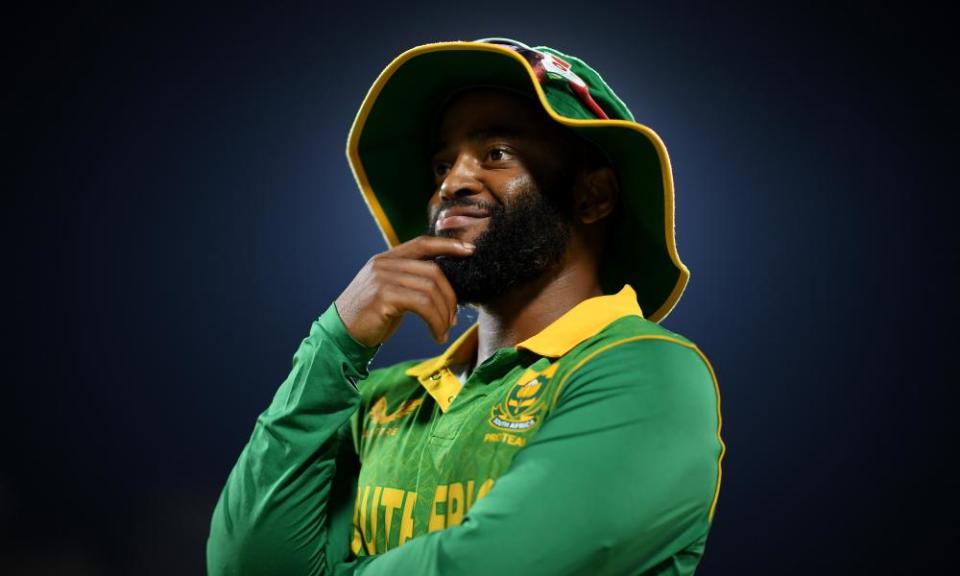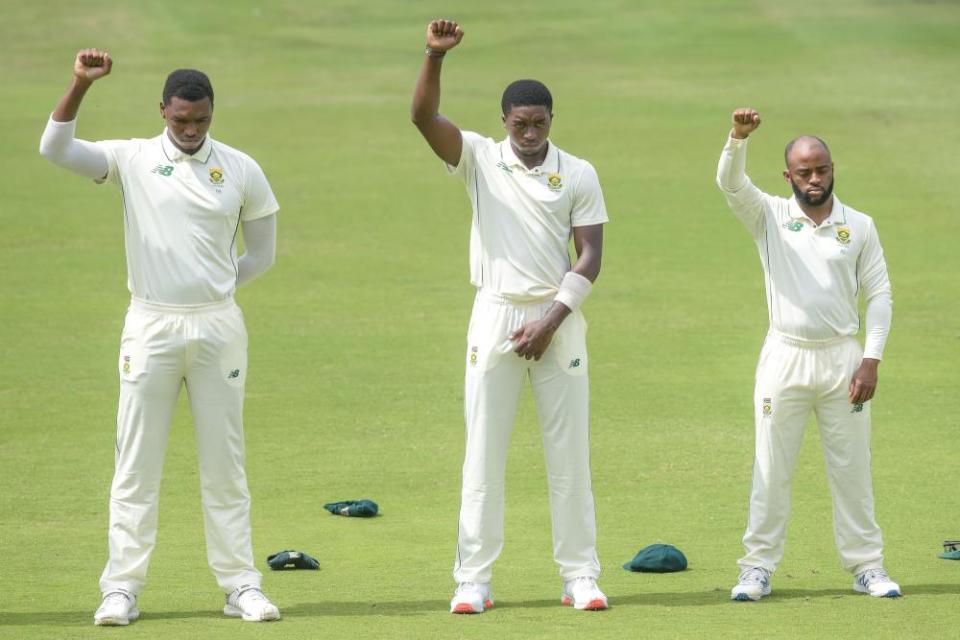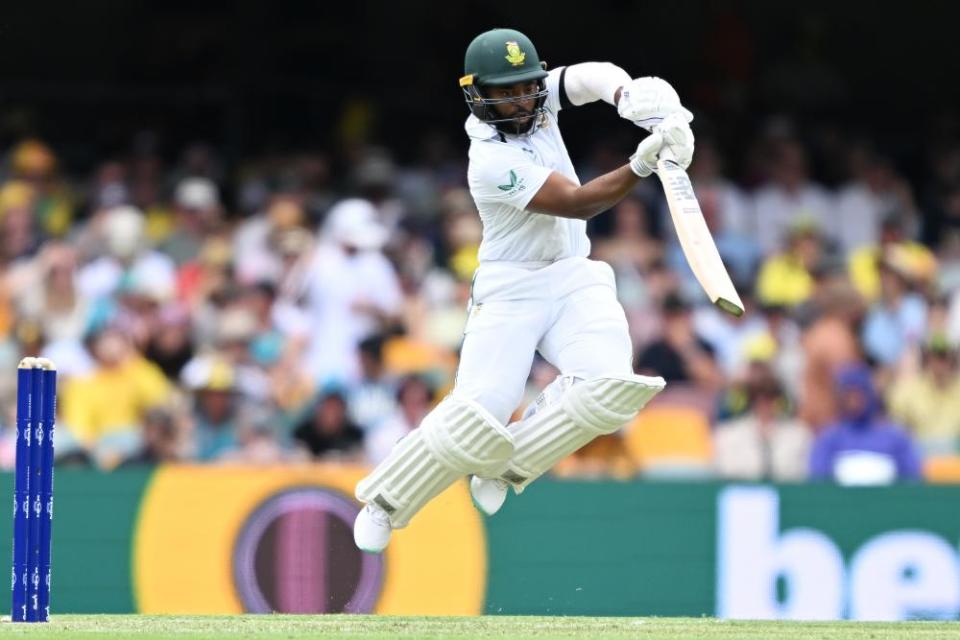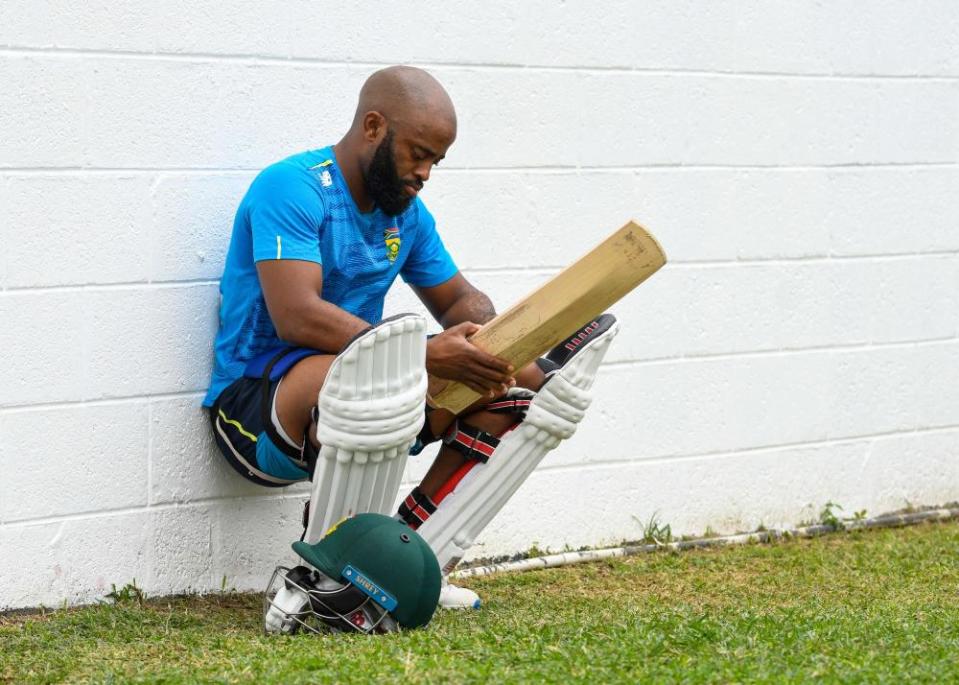
‘I’ve been a silent supporter of the way they’ve gone about things,” Temba Bavuma says as, in his role as the new captain of South Africa’s Test team, he considers the impact of Ben Stokes and Brendon McCullum on world cricket. “I say silent because I’m still a competitor of theirs. I’ve always seen England as pioneers of cricket, but over the last year they’ve started to revolutionise the Test game.
“We saw that in one-day cricket, which resulted in massive success for them in winning a World Cup. Now we’re seeing it with the Test game as well. They have really changed how Test cricket is being played. We are taking a lot from their approach and, by adding our South African flavour, seeing how it could look like for us.”
Related: The Spin | Why Temba Bavuma’s second century matters, for himself and South Africa
Bavuma is at home in Johannesburg on a quiet afternoon and once he has celebrated Bazball, as he also calls England’s explosive style of Test cricket, he will reflect on a momentous few weeks in his career. In March, as South African Test cricket’s first black captain, he helped the Proteas to sweep aside West Indies. Fittingly, Bavuma finally scored his second Test century with a momentous 172 at the famous old Wanderers ground in Johannesburg.
Seven years, two months and 88 innings had passed since Bavuma hit his maiden Test century against England, in January 2016. He made history by becoming the first black South African to score a Test hundred. Bavuma is relieved now that his latest century meant he avoided making a different kind of history. Only New Zealand’s Adam Parore, who needed 92 innings, had to wait longer than Bavuma for his second Test hundred.
Bavuma saw 2,621 days pass between centuries, but he remained South Africa’s talisman and their best batter with a Test average of 43.88 over the past three years. He is 5ft 3in but plays international cricket with the giant symbolism of his pioneering presence rubbing up against the divisive complexities of life in South Africa. The 32-year-old brings discipline, empathy and intelligence to his leadership – which was so evident during the T20 World Cup in October 2021 when, as captain, Bavuma defused the row after his teammate Quinton de Kock’s refusal to take the knee. De Kock said an emotional thank you to “my captain, Temba … he’s a flipping amazing leader.”

They are very different men, but it is striking that Bavuma feels such an affinity with Stokes – who tried to needle the South African in a Test match in Cape Town seven years ago. After Stokes hit a career-high 258 and England compiled a massive 629 for six, Bavuma helped South Africa to almost match that score with his debut century of 102 not out. The congratulations from Stokes to Bavuma were as warm as the sledging had been feisty.
“He was really good,” Bavuma says. “He’s a tough competitor, a match-winner in all respects, the type of guy you want in your team any day of the week. I’ve enjoyed my battles with him and he’s got the better of me probably more than I have of him. I’m a big silent supporter of Ben Stokes – both the cricketer and also the way they’ve gone about reshaping their Test team.”
Last summer, during Stokes’s and McCullum’s second series, England recovered from 1-0 down to win the two remaining matches against South Africa with exhilarating panache. Bavuma was injured and he watched the series from South Africa while working as a television pundit. He says: “I thought to myself: ‘OK, the English have come with this new attacking way of playing. But they’re up against a really strong South African attack. We’ve got pace and skill and a good spinner in [Keshav] Maharaj.’
“The first Test raised some questions around their approach. But they ended up winning the next couple of Tests and not necessarily through Bazball. When the opportunities are there they definitely take on the game. But there’s still the finesse to read situations and play accordingly, which is something we can also learn from.
We are definitely challenging ourselves, like England, to keep pushing our game
Temba Bavuma
“It starts by challenging ourselves. The conversations have already started within the team and we speak more in terms of guys going out and expressing themselves. I guess that’s general cliched stuff. But if the opportunity is there to take the game we have to be brave and confident enough to do so. With Test cricket, you’ve got to find that balance between absorbing pressure and then applying pressure on the opposition. So we’re having these conversations and, because it’s fairly new for us, it’s tricky to articulate. But we are definitely challenging ourselves, like England, to keep pushing our game.”
The Ashes will dominate the English summer and Bavuma is in an informed position to predict the outcome. Three months ago, he was South Africa’s most successful batter, with a middling average of 37.0, as they were dominated by Australia and needed rain in the final Test to avoid a 3-0 series whitewash.
“Australia is one of the toughest places to tour,” he says. “It’s very intimidating and it really opens your eyes. You look at that Australian bowling attack and none of those guys are giving you a breather. It really showed the gap between where I was and where the best guys in Test cricket were – guys like Usman Khawaja, Steve Smith, Marnus Labuschagne and David Warner.

“We had a young squad and only three or four of us had been to Australia before. I learned a lot from that tour. Coming back from it I sat down and had a deep look at my game – where it was, where it needed to be and what I needed to do to close that gap.”
Who did Bavuma struggle against most when facing Australia’s formidable attack? “I think [Pat] Cummins. I found him quite challenging because he’s relentless with a high level of skill. You’re not getting many bad balls from him. And when [Josh] Hazlewood came back he strengthened their bowling.
“Facing a tall guy who is getting the ball to rise from a good length tests me a lot more than maybe a guy like [Scott] Boland, who is still very good but doesn’t necessarily get that steep bounce Hazlewood can generate because of his height.”
Turning his attention to England’s bowlers, Bavuma focuses on Jimmy Anderson and Stuart Broad. “Anderson in England is near impossible [to play] at times. I found Broad to be quite tough in England as well as South Africa. That’s probably because of the angle he creates at the crease. Both those guys are superb exponents of swing and seam bowling in those conditions and they will bring vital control to England’s attack.”
Asked to predict a likely winner of the series Bavuma smiles. “The way England have been batting makes it an exciting one. But it won’t be easy for them against that Australian attack. It’s a tough one but I’ll back the English. The conditions play a massive part and adapting to them will be a lot easier for them. I would go with the English.”
Bavuma hopes to play country cricket this season and, if he is in England, “I’ll definitely go and watch a day or two of the Ashes live if I can. Watching it live and on TV are very different.”
The economic stranglehold India, England and Australia exert over international cricket means that countries such as South Africa now have meagre opportunities to play Tests. Bavuma turns a miserable situation into a chance to play in England. “It’s a bit unique this year in terms of our schedule,” he says diplomatically, “as we’ve got a long international break. After we play the Netherlands [in a two-match ODI series] we have no cricket until September and that’s a white ball warm-up against Australia [before the World Cup]. So during that time I’d love to get some cricket in. I really enjoyed playing for Northants in 2019 and they got promoted that year. So if another county opportunity comes I would super enjoy it.”
Bavuma shrugs when asked about the iniquities of an international schedule that only suits the richest countries. “That’s the reality. It’s hard to accept you’re going to be playing less and less. But as players our responsibility is to make sure our performances are of such high quality that these bigger teams – England, Australia, India – are lining up to play us.”

There are few better stories in world cricket than that of Bavuma. His rise from the township of Langa, adjoining Cape Town, to being the first black South African picked as a Test batter to captaining his country, is moving and inspirational. Bavuma has faced many challenges on and off the pitch, which made the imperious way he ended his long wait for that elusive second Test century so exhilarating.
“It’s difficult to put into words,” Bavuma says with a grin as he tries to explain his emotions when he reached his hundred against West Indies with a sumptuous lofted cover drive. “There was relief and satisfaction. The lack of hundreds brought an individual pressure which came with a lot of criticism as well. But within the team the guys appreciated my presence and my contributions and I took comfort and confidence from that.”
Did the pressure feel excruciating as he moved into the 90s? “It might sound a bit strange but I didn’t feel any pressure. There was a certain level of confidence that I haven’t really felt in the past when I would get ahead of myself. This was different. I was able to stay in the present and deal with the ball in front of me.”
It is typical of Bavuma that, once he reached the milestone, “I reminded myself that the match wasn’t over and I really wanted to go big with it.”
That winning innings was the latest example of how Bavuma elevates South Africa, as a country and a cricket team, during troubled times. “When I made my Test debut [in 2014] I was really naive and ignorant,” he says. “I was just a young boy who fell in love with cricket, but the more I played the more I understood my significance in the team. That went far beyond my dreams as a kid. It’s definitely an added pressure and it can get heavy to carry. It can feel burdensome.”
Bavuma pauses before he looks up. “But it’s also something I’ve tried to see as a privilege – to carry on and take it as a part of my journey. It’s tough and I don’t think the system really prepared me to deal with all the pressures that come with it. So at times it becomes difficult to see who you can speak to about those challenges. But I’m not complaining. It’s something that I have to carry and I will do so bravely, with a smile on my face, while not forgetting that I’m at this level because I once loved this damned sport. I still have this wonderful opportunity to live through my passion.”
Article courtesy of
Source link